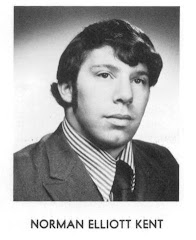
Guest Blogger, former Seattle Police Chief, Norm Stamper Speaks Out
The president is busy. He's got important things to do, like rescuing the economy, saving jobs and mortgages and industries. But we ought not to let him off the hook for his frivolous dismissal of a widely popular question he faced in Thursday's Online Town Hall
At the top of the televised event, the president announced that of the 3.5 million votes on the thousands of questions received in advance, one topic "ranked fairly high." It was whether legalizing marijuana would improve the economy and encourage job creation. He responded: "The answer is no, I don't think that is a good strategy to grow our economy." He then asked rhetorically what the question says about "the online audience."
The president is busy. He's got important things to do, like rescuing the economy, saving jobs and mortgages and industries. But we ought not to let him off the hook for his frivolous dismissal of a widely popular question he faced in Thursday's Online Town Hall
At the top of the televised event, the president announced that of the 3.5 million votes on the thousands of questions received in advance, one topic "ranked fairly high." It was whether legalizing marijuana would improve the economy and encourage job creation. He responded: "The answer is no, I don't think that is a good strategy to grow our economy." He then asked rhetorically what the question says about "the online audience."
Get it? His in-the-flesh audience got it, chuckling politely at the allusion to a Stoner Nation plugged in to the "internets." The problem for Mr. Obama is that marijuana reform was at or near the top of the list of all questions in three major categories: budget, health care reform, green jobs and energy. Our leader doesn't seem to understand that millions of his interlocutor-constituents are actually quite serious about the issue.
Which is not to say that drugs, particularly pot, doesn't offer up a rich if predictable vein of humor. Cheech and Chong's vintage "Dave's not here!" routine is still a side-splitter. As Larry the Cable Guy would say, "I don't care who you are, that's funny right there."But there's nothing comical about tens of millions of Americans being busted, frightened out of their wits, losing their jobs, their student loans, their public housing, their families, their freedom...
And show me the humor in a dying cancer patient who's denied legal access to a drug known to relieve pain and suffering.
Having just returned from Minnesota whose state lawmakers are entertaining a conservative, highly restrictive medical marijuana law, I can tell you what's not funny to Joni Whiting.
Ms. Whiting told the House's Public Safety Policy and Oversight Committee of her 26-year-old daughter Stephanie's two-year battle with facial melanoma that surfaced during the young woman's third pregnancy. The packed hearing room was dead quiet as Ms. Whiting spoke of Stephanie's face being cut off "one inch at a time, until there was nothing left to cut." She spoke of her daughter's severe nausea, her "continuous and uncontrollable pain."Stephanie moved back to her family's home and "bravely began to make plans for the ending of her life." The tumors continued to grow, invading the inside and outside of her mouth, as well as her throat and chest. Nausea was a constant companion. Zofran and (significantly) Marinol, the synthetic pill version of THC, did nothing to abate the symptoms. Stephanie began wasting away. She lost all hope of relief.
Joni's other children approached their mother, begged her to let their sister use marijuana. But Ms. Whiting, a Vietnam veteran whose youngest son recently returned from 18 months in Iraq, was a law-abiding woman. And she was afraid of the authorities. There was no way she would allow the illicit substance in her house. As she held her ground, her grownup kids removed Stephanie from the family home. Three days later, wracked by guilt, Joni welcomed her daughter back. "I called a number of family members and friends...and asked if they knew of anywhere we could purchase marijuana. The next morning someone had placed a package of it on our doorstep. I have never known whom to thank for it but I remain grateful beyond belief." The marijuana restored Stephanie's appetite. It allowed her to eat three meals a day, and to keep the food down. She regained energy and, in the words of her mother, "looked better than I had seen her in months."
Stephanie survived another 89 days, celebrating both Thanksgiving and Christmas with her family.
Shortly after the holidays, Stephanie's pain became "so severe that when she asked my husband and me to lie down on both sides of her and hold her, she couldn't stand the pain of us touching her body."Stephanie died on January 14, 2003 in the room she grew up in, holding her mother's hand. A mother who, as she told the legislative committee, would "have no problem going to jail for acquiring medical marijuana for my suffering child."
Following Joni Whiting's presentation, it was all I could do to hold it together during my own testimony. Such was the power of this one woman's story. And of the sadness and rage roiling inside me as I reflected on the countless other Stephanies who are made to suffer not only the ravages of terminal illness and intractable pain but the callousness and narrow-mindedness of their leaders.
When I finished my testimony, a local police chief, a member of the committee, angrily accused me of disrespecting the police officers in the room--who'd shown up in force, in uniform, to oppose medical marijuana. Wearing a bright yellow tie with the lettering "Police Line, Do Not Cross," the chief charged me with placing more stock in the opinions of doctors than of Minnesota's cops. Guilty, as charged. Who are we, I asked him, to substitute our judgment for that of medical professionals and their patients? Who are we, for that matter, to deny the will of the people.
There's much value in humor, even during times of pain and tragedy. So long as the joke is not at the expense of the suffering.
It's been a bad couple of weeks for the president. His Leno comment about the Special Olympics while self-deprecating and not malicious was certainly tone deaf, followed soon after by his casting gratuitous aspersions at serious advocates of marijuana reform. But Barack Obama is a decent and honorable man, compassionate and wise. I can't believe he would do anything other than what Joni Whiting did if, God forbid, he faced similar choices within his own family. I can't believe he doesn't realize the political value of taking a more reasoned, courageous stand on drug policy reform in general. Or of at least providing honest, thoughtful answers on the issue.Perhaps we should show him what's in it for him?
Perhaps we should make certain that in every future "town hall" the president is reassured of the seriousness of the legions of voters working to end cruel and ineffective drug laws.
http://www.huffingtonpost.com/norm-stamper/marijuana-no-laughing-mat_b_180378.html
















.jpg)
















